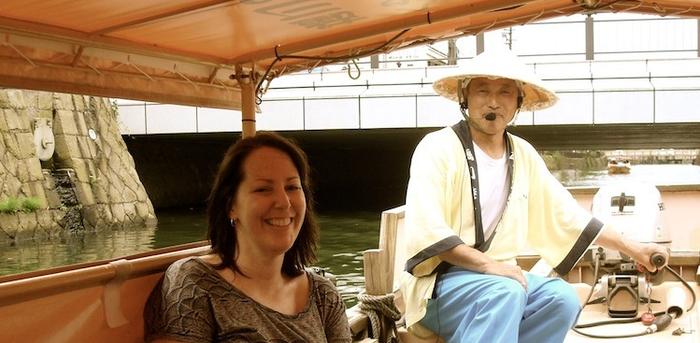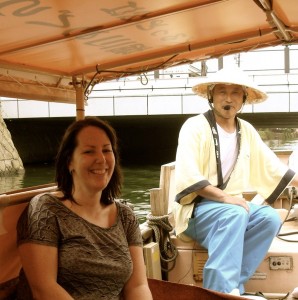
We’ve all experienced what it’s like for women to work in a Western workplace, but around the world, issues and expectations for women vary immensely. In many cultures, women still aren’t considered equals. In others, they face everything from dealing with pressures to drinking heavily with their associates to learning to turn on the charm (or the rage) in order to get their work done.
Recently, I had the opportunity to interview six global professionals about the unique challenges they face living and working abroad. If you’re considering work in another country—or have ever wondered what it’s like—read on for their (often surprising) stories, and the wisdom they’ve gained for navigating unfamiliar territory.
In Korea: Bow, then Drink
 In the Korean workplace, age and rank is strongly respected. Younger workers must bow to and follow the orders of anyone who is older than them. This age segregation often makes it difficult for younger employees to make their opinions heard.
In the Korean workplace, age and rank is strongly respected. Younger workers must bow to and follow the orders of anyone who is older than them. This age segregation often makes it difficult for younger employees to make their opinions heard.
Company dinners are common and compulsory in Korean conglomerates—and in this environment, Korean bosses may pressure their employees to drink huge amounts of rice wine or beer, which is used as a method to make the workers “feel closer.” Female workers in Korea are not happy with the heavy drinking company culture—but this atmosphere is slowly changing as more women enter the workforce.
Luigina Webb, Blogger and Translator
In Mexico: Learn to Swim
 I spent my first two months in Mexico on the verge of an ulcer as I struggled to exercise my own work ethic in an environment running against everything I knew from the States. Classes and meetings do not need to start right on time. Events do not need to be perfectly attended. A two-hour lunch enjoyed in the presence of others is not a waste of time; it’s a social staple of the day. Individually greeting and saying good-bye to all your co-workers with a kiss and warm “How are you?” is required—even if it kills the first and last 10 minutes of a meeting.
I spent my first two months in Mexico on the verge of an ulcer as I struggled to exercise my own work ethic in an environment running against everything I knew from the States. Classes and meetings do not need to start right on time. Events do not need to be perfectly attended. A two-hour lunch enjoyed in the presence of others is not a waste of time; it’s a social staple of the day. Individually greeting and saying good-bye to all your co-workers with a kiss and warm “How are you?” is required—even if it kills the first and last 10 minutes of a meeting.
Focusing on the differences, indeed, makes the observer different. I stopped staring into the pool, observing people from where I felt safe, and I jumped in. Swimming in the water with my colleagues is much more interesting.
Ivie English, Fulbright English Teaching Assistant
In Bulgaria: Stand Your Ground to Get Things Done
 In Bulgaria, services will be slow, counter-intuitive, or downright unhelpful, and when you are out on business, it may become a challenge to make people who don't know you personally take you seriously. If you are considered to be unimportant (visible indicators are being young, female, polite, working for some unheard-of organization), you will often be treated as an afterthought. You don't have automatic rights or privileges. You have to earn them by swagger.
In Bulgaria, services will be slow, counter-intuitive, or downright unhelpful, and when you are out on business, it may become a challenge to make people who don't know you personally take you seriously. If you are considered to be unimportant (visible indicators are being young, female, polite, working for some unheard-of organization), you will often be treated as an afterthought. You don't have automatic rights or privileges. You have to earn them by swagger.
I find that nothing works better to overcome such patriarchal barriers than steely arrogance, dogged insistence, and mulish obstinacy. In short, make a nuisance out of yourself. Say things like "Do not presume to take this tone of voice with me, or you will regret the consequences" in a bank, and suddenly you will be treated like a VIP client. Or: "I will continue to ring you and keep your line busy until you do what I want you to do." Works like a charm, because people are caught off guard by the dissonance between their expectations and your actual firepower.
Maria Spirova, Former Editor of Glamour Magazine Bulgaria
In India: Everything That Must Get Done, Will Get Done (Somehow?)
Getting your work done in India is akin to undertaking a lesson in bull fighting. Snorting, stomping, and becoming flustered at the tedious slowness will only make you sweat, get mad, and remain exactly where you were: waiting in line. Instead, the smarter option is often to turn on the charm, smile a lot, banter with the other person, dress well, and wait for your feminine power to unfasten secure locks and fast-track the work like never before. The luggage then gets hauled onto the bus, the bus tickets get printed, and the tailor manages to make the shirt just right.
India is a land of relationships, where everyone from the bank teller to the vegetable seller wants to know you and get a glimpse of who you are. Once that connection is made, the chaotic confusion transforms into a land of 100 wallas (guys who do things for you) all working in sync with the other.
Neha Jain, Lawyer and Traveler
In Pakistan: Juggling the Work of Five
 In my experience in most workplaces here, one person is hired to do the job of five people. So people here in the private sector are overworked (not the public sector—where usually one person doesn't do the job of even half of one). Ending the day at 6 PM is not common for most people in the white-collar working class.
In my experience in most workplaces here, one person is hired to do the job of five people. So people here in the private sector are overworked (not the public sector—where usually one person doesn't do the job of even half of one). Ending the day at 6 PM is not common for most people in the white-collar working class.
As a woman in the corporate sector, I learned the lesson early that to establish yourself as a strong professional, you need to appear to be stronger and smarter than the men you work with. So it has been a “performance” for me to find and maintain my place as an equal in the corporate social environment
As a photographer in Pakistan, I still have to work harder to understand the culture. I have noticed my male subjects’ initial discomfort when they see me (especially when I shot folk musicians from Peshawar and other northern areas), but at the end of the day in both the corporate and art worlds here, it all depends on how comfortable you are in your own skin and how confident you are as a professional. It smooths out biases and bad experiences. If you treat yourself objectively, others will eventually, too.
Soofia Asad, Photographer and Artist
In Japan: Sing Loud and Proud
 In Japan, being shy often works in your favor, which suits me just fine. Shyness comes across as having a sense of humility, a valued trait. But when you go out with co-workers after work (which really isn't "after work," but an extension of work) and the opportunity appears, sing karaoke.
In Japan, being shy often works in your favor, which suits me just fine. Shyness comes across as having a sense of humility, a valued trait. But when you go out with co-workers after work (which really isn't "after work," but an extension of work) and the opportunity appears, sing karaoke.
It doesn't matter if you have a good voice. It doesn't matter what song you chose. It doesn't matter if anyone is paying attention—because they probably aren't very much. What's important is that you do it with a positive attitude and a smile on your face. The Japanese view karaoke as a way to have fun and relieve stress. Being game and willing to join in the fun makes you one of the group. You may think singing in front of co-workers would make you stand out more, but by singing you are joining the crowd. Refusing to do so makes you seem standoffish. For extra bonus points, sing a duet with your boss!
Pam Ikegami, Lecturer in Japanese at the University of New Hampshire
